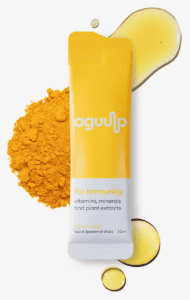
What’s the Link Between Gut Health and Immune System Health?

Your gut and immune system are closely linked – more closely than you probably ever realised. In fact, a huge proportion of your immune system actually begins in your gut.
During winter, when your body is under extra stress, or when you’re next feeling run down, think about that link between your gut health and immune system and give your body the tailored self-care it deserves. Read on to learn everything you need to know about how to do exactly that.
How much of the immune system is in the gut?
Around 70% of the immune system starts in the gut. The human cells in your body only actually make up 43% of your total cells (mind-blowing, we know!). The rest are microscopic colonisers such as bacteria, viruses, and fungi. These are everywhere, but the greatest concentration of this microscopic life resides in your intestine. Your gut is the perfect environment for these bacteria – it’s wet, dark, and there’s always food.
Dr Martin J. Blaser, director of the NYU Human Microbiome Programme, stated: “It’s reasonable to propose that the composition of the microbiome and its activities are involved in most, if not all, of the biological processes that constitute human health and disease.”
How are gut health and immune system health linked?
The link between your gut health and immune system starts with your gut microbes. So how does gut bacteria help the immune system exactly? Good gut bacteria help us digest food, enrich the body with nutrients, strengthen our immunity, and even synthesise some vitamins and hormones. Not only are beneficial gut bacteria needed for a healthy immune system, but they’ve also been linked to mood, sleep, and even obesity.
Meanwhile, pathogenic bacteria, if left to thrive, can result in a weakened immune system, a poor or unstable mood, increased stress, malnutrition, and even disease.
Taking care of your gut health isn’t just important for keeping your bowel movements regular and your tummy happy – it can have a big impact on your overall health and your risk of illness. As it’s our immune system that provides resistance against potentially harmful infections and toxins that threaten our health, supporting and strengthening it is key to ensuring we have the best possible defences against disease.
It’s especially important to focus on the health of your gut and immune system as winter approaches and your body becomes more susceptible to colds, flu, and other infections. By understanding how both your gut health and immune system are impacted by some elements of your environment, you can learn how to optimise your health to protect both yourself and others. The immune system can only work as it should if it’s cared for properly, with the necessary nutrients, the right environment, and avoiding anything that might impact your immunity.
The importance of diet for your gut and immune system
Poor nutrition is believed to be the most common cause of a weakened immune response. As the saying goes, ‘you are what you eat’, and the foods we consume have a significant impact on the way we feel and function. Unfortunately, in order to meet the demands of the fast-paced life most of us lead, convenient and processed foods tend to feature heavily in our diets. This can potentially wreak havoc on your gut health and immune system health too.
Convenience foods tend to consist of highly refined and heavily processed ingredients that are often deplete of important nutrients. The body has to work harder to break these foods down, which in turn further depletes vital nutrients. In particular, processed foods often contain added or unwanted ingredients such as hidden fats, sugar, salt, and chemical additives, which may be potentially harmful to health.
What’s more, substances like saturated fat and caffeine, alongside other stimulants such as alcohol and smoking, all have the ability to suppress the immune system and prevent it from working as it should. Keep reading for our top tips on what to include in your diet to benefit both your gut and immune system.
Other factors impacting gut and immune system health
Diet isn’t the only factor that can impact your gut health and immune system. Stress, pollution, and our wider environment can all play a role too.
When we’re stressed, the normal activity of white blood cells that are needed to fight infection is suppressed. Stress also depletes the body of vital nutrients. Both of these factors result in impaired healing ability and increased susceptibility to infection.
Other factors that can have an impact on our immune system and how it functions include:
- The use of antibiotics and other drugs
- Pesticides
- Exposure to environmental pollutants
- Chemicals in the household cleaners
As a result, making a few small changes to your diet and lifestyle can set you on the right path to optimising your gut health and immune system.
How to improve both your gut and immune system health
From cutting down your sugar intake to minimising how much alcohol you drink to staying hydrated, here are our top tips for looking after both your gut health and immune system:
1. Ditch the sugar
Sugar can interfere with both your gut and immune system. Research on human subjects is scant, but animal studies have shown that sugar suppresses immune response.
More research is needed to understand the exact mechanisms, but we do know that bacteria and yeast feed on sugar, and when these organisms get out of balance in the body, infections and illness are more likely.
Unfortunately, sugar is found in many foods these days – not just what we consider ‘junk food’. Sugar is also present in sweetened fruit juices, bottles of flavoured water, low-fat yoghurt, salad dressings, tomato ketchup, fizzy carbonated drinks, tinned soups, sports drinks, and more.
Working out how much sugar is in your food or drink can be confusing, as it appears in many different guises, including sucrose, glucose, fructose, and honey. It’s important to be aware of the quantities in your food by checking food labels for anything ending in ‘ose’ as a start.
2. Minimise caffeine and alcohol
Caffeine and alcohol are stimulants that activate an internal stress response in the body, which can affect both your gut health and immune system. Consuming regular stimulants can result in dysfunction and ultimately fatigue of the adrenal glands, which are responsible for producing stress hormones. Adrenal fatigue is associated with suppressed immunity, increasing our susceptibility to illness and infections.
Caffeine is also a diuretic and depletes the body of vital nutrients needed for a healthy immune system. It’s recommended to limit tea and coffee to just one to two cups per day. Herbal and fruit teas are good alternatives and count towards your water intake too.
Consume alcohol in moderation and in line with current government guidelines. Read more about the link between alcohol and gut health.
3. Cut down on refined carbs and processed foods
Processed foods and those containing refined carbohydrates often contain added or unwanted ingredients that may be harmful to your health. Instead, try to base your diet around whole foods, which are those that are in their natural state and minimally processed. An example would be to switch from white bread or pasta to wholemeal varieties.
4. Look after your digestive system
Beneficial gut bacteria (bifidobacteria and acidophilus) are considered to be one of the first lines of defence against bacteria, viruses, and fungi.
Specific strains such as Lactobacillus casei and Lactobacillus reuteri have been scientifically shown to prevent colds and to improve the immune response. Beneficial bacteria can be found in food sources such as yoghurts and kefir, which can be included in your diet on a daily basis. Discover more fermented foods that contain beneficial gut bacteria.
Taking a good quality probiotic supplement is also a good option to make sure you’re getting good levels of these beneficial bacteria, allowing you to look after your gut health and immune system with one easy-to-take supplement. Our aguulp probiotic formula contains Bifidobacteria, Streptococcus, and Lactobacillus, all of which can play a role in supporting the immune system.
5. Stay hydrated
Every single bodily process relies on water. It helps the body absorb nutrients and maintains hydration. Drinking water isn’t your only option, as herbal and fruit teas also contribute to water intake, as do fresh fruits and vegetables as they consist mainly of water.
Carbonated and other fizzy drinks should be eliminated as they deplete important nutrients needed for immunity and can sometimes be high in sugar and artificial sweeteners and chemical additives.
6. Eat plenty of protein
The importance of adequate protein intake to proper immune function has been extensively studied. Adequate protein is essential for optimum immune function, as a protein deficiency is associated with a compromised immune system and poor resistance to infection.
Protein helps to form antibodies to attack viruses in the face of potential infection or disease. Protein should form the basis of every meal and snack, and should account for one-third of your dinner plate.
Good sources of protein include:
- Lean white meat, such as turkey and chicken
- Fish
- Eggs
- Legumes
- Lentils
- Beans and pulses
- Nuts and seeds
- Tofu
- Quinoa
7. Be mindful of saturated fats
You should try to limit your consumption of saturated fats to take care of both your gut health and immune system function too. Foods such as red meat and dairy are particularly high in saturated fat. Opt for polyunsaturated fats instead, particularly essential fats such as omega-3, which has been shown to play an important role in immune health. Sources of omega-3 include oily fish, walnuts, pumpkin seeds, flaxseed, and seed oils.
This is important because it can help to keep your lymphatic system (one of the main action areas of your immune system) functioning properly. The lymphatic system transports fat round the body to the liver, so if it gets too clogged up with fat, the immune system is weakened. When your lymph nodes are overworked, they become lumpy and swollen in the neck, which is often painful to the touch.
Other ways to help ensure the lymphatic system works at its best include practising deep breathing, regular exercise, and ensuring you get enough sleep. Need a hand getting a good night’s rest? Check out our sleep supplements.
Immune System Supplements

At aguulp, we have easy-to-take supplements for gut health and immune system support and a whole range of other health benefits too.
Our aguulp for immunity formula is designed to be taken daily to give your immune system a boost when it needs it most. This tasty natural orange-flavoured supplement is packed full of vitamins, including vitamins A, B, C, D and E, as well as your recommended daily allowance of omega-3 fatty acids. Incorporate this powerful multivitamin supplement in your daily routine and start looking after your immune system better.
Shop our full collection of liquid supplements.


